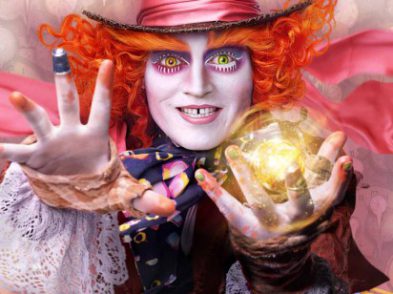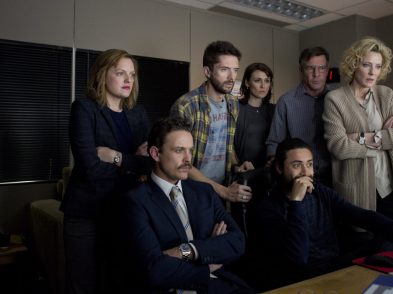ODEON CINEMA piazza Strozzi 2 – tel. 055/295051
For details and show times, see the venue websites listed.
JANUARY 16–19
DISCONNECT
The interwoven stories of three sets of people whose lives are somewhat derailed directly or indirectly through their use of the Internet. Is it possible that a dangerous disconnect can be the consequence of the greatest connector in the history of humankind? ‘One of the rare films that directly responds to and expresses modern anxieties’ (San Francisco Chronicle). ‘Even when Disconnect follows the path we expect it to follow, it does so in a way that keeps us intensely engaged’ (Chicago Sun-Times). ‘The film ominously conveys a world of too much information but too little communication, where people have become slaves to glowing hand-held devices that were designed to make life easier but have made it busier and more complicated’ (New York Times). ‘Well-meaning but dated and frequently risible issue-drama’ (Variety).
January 20–22
THE COUNSELOR
Cormac McCarthy’s script is directed by Ridley Scott. Counselor is a lawyer who is lured into a world of drug dealing that he is not equipped to cope with. With characters such as the middleman Westray and shady hedonist Reiner the scene is set for dangerous and devastating fallout. ‘The Counselor achieves the almost unheard-of daily double of giving us the most outrageous sex scene of the year AND the most unforgettably brutal murder of the year. This is a badass journey from start to finish’ (Chicago Sun-Times). ‘The Counselor is the cumbersome end product of a high-minded writer trying to slum and a slick director aiming for cosmic depth’ (Village Voice). ‘A movie that, despite its strenuous efforts to appear hardened and sexy and sleek, is unforgivably phony, talky and dull’ (Washington Post). ‘Despite its scaldingly hot cast and formidable writer/director combination, The Counselor is simply not a very likable or gratifying film. In fact, it’s a bummer’ (The Hollywood Reporter).
January 27–31
NEBRASKA
A tour de force by Bruce Dern in Alexander Payne’s highly acclaimed drama. He is sozzled, decrepit Woody Grant hitting the road from Montana to Nebraska to claim a million-dollar sweepstakes prize. ‘Shot in beautiful tones of black and white (and silver and gray), Nebraska is steeped in nostalgia, regret and bittersweet moments. Yet it’s also a pitch-perfect cinematic poem about the times we live in’ (Chicago Sun-Times). ‘Only someone with intimate knowledge of the Midwest’s singular cadences, social codes and confounding emotional stew (er, covered hot dish) of aggression and politesse could pull off something as masterful, meaningful and poetic as Nebraska’ (Washington Post). ‘Nebraska may not be startlingly new, and sometimes we can see the epiphanies looming up over the distant horizon’ (The Guardian). ‘The absurdist atmosphere feels thin: the movie is like a Beckett play without the metaphysical unease, the flickering blasphemies and revelations’ (The New Yorker).
January 24–26
THE WOLF OF WALL STREET
Martin Scorsese’s adaptation of convicted wealthy stockbroker Jordan Belfort’s memoir chronicling his rise and fall on Wall Street in the 1990s. Corporate banking corruption and investor defrauding are par for the course along with his hard-partying, addiction-fuelled personal life. Scorsese is at full throttle in this salacious and overlong exercise in debauchery. ‘The oddest thing of all about The Wolf Of Wall Street is also the most unusual for a Scorsese film: it is incredibly, incredibly funny’ (Empire). ‘As hot and wet as freshly butchered meat: every second, every frame of its three-hour running time is virile with a lifetime’s accumulated genius’ (The Telegraph). ‘This movie may tire you out with its hammering, swaggering excess, but it is never less than wide-awake’ (New York Times). ‘If you’re going to invest three hours watching a movie about a convicted stock swindler, it needs to be a whole lot more compelling than Martin Scorsese’s handsome, sporadically amusing and admittedly never boring — but also bloated, redundant, vulgar, shapeless and pointless — Wolf of Wall Street’ (New York Post).
BRITISH INSTITUTE of Florence
Lungarno Guicciardini 9 – tel. 055/26778270
Visconti Retrospective. Introducing an almost complete collected works of the great Italian director from his first film in 1942 to the last in 1976
January 22, 8pm
OSSESSIONE
In Italian with English subtitles
Visconti’s first film made under difficult conditions in wartime Italy. Borrowing (without acknowledgement) James M. Cain’s American noir classic The Postman Always Rings Twice, and transposing the action to the banks of the Po in Emilia Romagna, this precursor to Neo-realism had all the elements designed to shock the fascist establishment with its realism (poverty and unemployment) and steamy melodrama (murder and adultery), a calculated riposte to the escapist drivel of romantic comedy and militarist propaganda beloved of the ruling ideology. Duly suppressed and officially vilified in the few weeks before the regime fell, the movie survives thanks to Visconti’s foresight—he sneaked away a copy of the negative before the Fascists could get their hands on it. An auspicious and impressive start to a momentous career.
January 29, 8pm
LA TERRA TREMA
In Italian with English subtitles
With his Communist Party credentials fully displayed, Visconti transformed what might have been a reverential, dreary and dry, not to mention ideologically overwrought documentary into a poetic and compassionate slice of life drama in the small, tightly-knit community of a Sicilian fishing village. Caught up in the intricacies of middlemen exploiting the simple folk of Aci Trezza, Visconti’s characters in full Neo-realist flow act out their joys and despair in a compelling vision of ordinary people in ordinary situations. With its trademark direct observation of the underprivileged and their travails, non-professional actors (the people of the village play themselves), location shooting and natural lighting wherever possible, the movie is a classic of Neo-realism, and emblematic of Visconti’s first phase, in contrast with the later lavish international productions that made his name.







